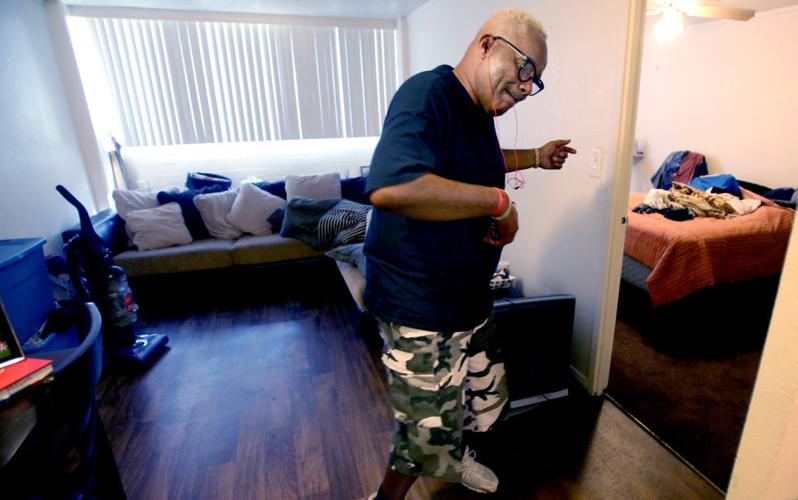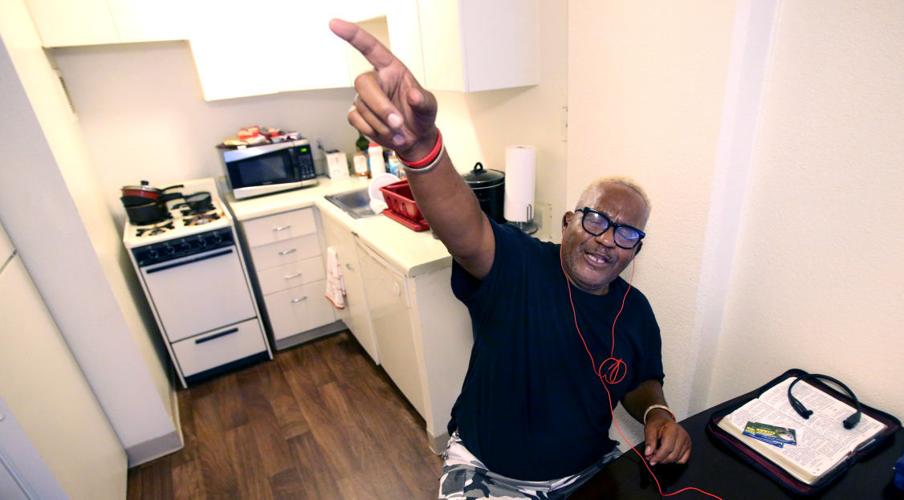The city of Tucson set an ambitious goal in June 2013: to end homelessness among local veterans.
The end is already in sight — through an initiative launched by the city and other local agencies, about 1,200 formerly homeless veterans now have permanent housing.
There are still 442 to go, but Mayor Jonathan Rothschild expects them all to be in apartments by the end of the year.
“If we work diligently over the next four months, we’re on pace to make our goal,” Rothschild said. “Based on our experience from the last 27-28 months and given the additional focus, we should be there.”
He has requested more caseworkers and more data sharing from the VA in order to reach the goal.
To find all the homeless veterans, Pima County created a central tracking system to identify them and prioritize their housing needs, said Karla Avalos, who works on veterans’ homelessness issues as community organization and development director for the mayor’s office.
The Homeless Management Information System tracks info gathered from an annual community effort every January in which outreach teams go to washes, shelters and other places where homeless individuals may live.
“Many of the participants are people who had those experiences themselves and have come out of it and are now working to get other people help,” Rothschild said of the outreach teams.
The information they gather is entered into the system, and that data is used for what’s known as a vulnerability index.
The index determines the level of support a homeless veteran needs, Avalos said. Once the veteran qualifies, their agreement can be renewed annually. Their housing is inspected every two years.
“They could need permanent supportive housing, transitional housing or they maybe just need some help with their rent,” she said.
Veterans may also be referred to the Department of Veterans Affairs to determine whether they qualify for vouchers through the Housing and Urban Development’s Veterans Affairs Supportive Housing program, which provides housing to homeless veterans, said Danna Auriana, supervisor for HUD-VASH at the Southern Arizona VA Health Care System.
The initiative is part of the Obama administration’s Mayors Challenge to End Veterans Homelessness, a combined effort of HUD, the VA, the U.S. Interagency Council on Homelessness and local agencies in cities across the country.
Through the campaign, the city, Pima County, the city of Tucson Housing Authority, the VA hospital and other nonprofit organizations formed the Tucson Pima Collaboration to End Homelessness, which has met every other week for two years to monitor the progress of the program, Rothschild said.
The long-term goal is not just to use the system for homeless veterans, but to utilize it to house other chronically homeless people in Tucson, said Lisa Markkula, communications director for the mayor’s office.
SUCCESS STORY
Charles Wrenn, a 67-year-old Vietnam War veteran, was homeless until a year ago.
He lived out of the truck he drove across the country, and was in transitional housing before that.
His apartment at Catalina Towers in midtown Tucson is modest, with furniture purchased at steep discounts. A picture of his football-player nephew who came to live with him sits on the table.
He was able to secure the apartment because he qualified for a HUD-VASH voucher.
“Thank God for the HUD-VASH that I got this place to live,” he said.
Wrenn grew up in San Angelo, Texas, played high school football and got a rodeo scholarship before enlisting in the Navy in 1966. He served in Vietnam as a Seabee, and then as a kitchen worker. He said he was aboard the USS Forrestal when it caught fire, killing 134 sailors.
After the war, he started driving a semi across the country. He ended up living out of the truck.
He landed in Tucson because the VA hospital in Phoenix couldn’t give him an open-heart surgery. So he had it here, at the VA hospital. Afterward, he no longer qualified for a commercial license.
“They took my livelihood,” he said.
A doctor at the VA learned he didn’t have a place to stay and got him into emergency housing for veterans. He stayed there for several months before learning about HUD-VASH.
He moved into his apartment a year ago.
FROM HOMELESS TO HOME
Jerry Carter, 53, was in and out of transitional housing until he secured a place to live at Nottinghill Apartments in midtown a month and a half ago through a HUD-VASH voucher.
The Army veteran said he’s grateful for the support he received from Nottinghill, not only in letting him live there, but from the supportive staff.
Renee Banuelos, property manager for Nottinghill Apartments, which houses about 60 formerly homeless veterans, said it’s important to her to keep the apartment complex a community.
“To me, there’s a lot that still needs to be done for these veterans,” Banuelos said. For example, she said the veterans need furniture and other things in their apartment because an empty apartment won’t feel like a home.
Markkula, of the mayor’s office, said that is something the Tucson Pima Collaboration to End Homelessness hopes to address.
“You place someone in housing and it’s an empty apartment — that isn’t a very welcoming environment,” she said. “That makes them more likely to fall back out of housing.”
She said the collaborative takes donations of furniture and other household items for homeless people through its work group 51homes.
Wrenn, who lives on Social Security disability benefits, said he managed to buy the biggest pieces of furniture for his apartment on discount.
He said he’s also seen the difficulty of homeless veterans transitioning back into a bed every night. While he stayed in emergency housing, he saw veterans leave because they couldn’t handle having bed checks at 10 p.m. every night.
“It’s hard as hell to tell somebody (who’s) been to war they have to go to bed at 10 p.m.” Wrenn said. “Some of these dudes would rather sleep on the street than go through that.”
The VA provides case managers and other support staff to each veteran, local VA representative Auriana said. Case managers keep track of how their veterans are doing and visit them at home at least once a month.
“We’re assessing them for any issues they need to work on — health, substance-abuse issues and legal,” she said.
Not all those who served in the military qualify for VA benefits. Auriana said in those cases, they refer them to nonprofit organizations and resources within the community who can assist them.
Tom Litwicki, chief executive officer for Old Pueblo Community Services, said his organization provides up to 150 beds for homeless veterans through its Veterans Bridge Housing Program. Old Pueblo also provides employment assistance, counseling and other support services.
A NEW LIFE
Wrenn’s days now revolve around his nephew, Cyleus McCurn, who came to live with him recently and plays football at Palo Verde High School.
He gets up at 4:30 a.m. every morning to wake up McCurn, who sleeps on his couch, so the teen can be at weightlifting by 6 a.m.
Wrenn goes to the YMCA downtown to exercise his legs after undergoing femoral bypass surgery because of poor blood circulation.
Following that, he catches the 3:30 p.m. bus to Palo Verde to watch McCurn’s practice.
He doesn’t eat out much. He occasionally takes McCurn out for steaks, but he’s mostly done with the restaurant scene.
“All I did was eat out for 30 years at truck stops,” he said. He keeps a picture of the semi he drove on his table.
Wrenn and McCurn are getting ready to move to another complex nearby where they can each have their own room. Wrenn said he’s “moving on up, just like George Jefferson.”
He is so proud of completing his first one-year lease that talking about it brings him to tears.
“When I went and paid the rent the third of this month, I sat right there and I cried,” he said. “It might mean nothing to nobody else … but it means something to me, man.”





